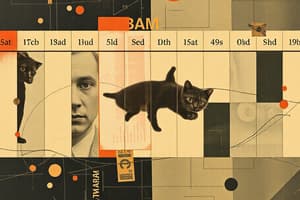Podcast
Questions and Answers
Teaching your cat to turn on the living room lights would best be accomplished by which method?
Teaching your cat to turn on the living room lights would best be accomplished by which method?
- Extinction
- Shaping (correct)
- Spontaneous recovery
- Classical conditioning
In operant conditioning, the reinforcer occurs __________ the response, and in classical conditioning, it occurs __________.
In operant conditioning, the reinforcer occurs __________ the response, and in classical conditioning, it occurs __________.
after; before
Two principles of conditioning that have aided our learning and improved our adaptability as a species are
Two principles of conditioning that have aided our learning and improved our adaptability as a species are
- Spontaneous recovery and extinction
- Lower order and higher order conditioning
- Stimulus generalization and stimulus discrimination (correct)
- Extinction and inhibition
Learning is best defined as
Learning is best defined as
Responses that are reinforced and tend to be repeated illustrate which concept?
Responses that are reinforced and tend to be repeated illustrate which concept?
To be effective, punishment should be
To be effective, punishment should be
Which of the following best describes the unusual events that occurred in Pavlov's laboratory leading him to the discovery of classical conditioning?
Which of the following best describes the unusual events that occurred in Pavlov's laboratory leading him to the discovery of classical conditioning?
After weeks of successful extinction trials, your pet dachshund suddenly resumes burying bones in the front yard. Your pet therapist advises you that the dog's behavior is an example of
After weeks of successful extinction trials, your pet dachshund suddenly resumes burying bones in the front yard. Your pet therapist advises you that the dog's behavior is an example of
Operant conditioning is to Skinner as classical conditioning is to
Operant conditioning is to Skinner as classical conditioning is to
Classical conditioning is most often used to condition
Classical conditioning is most often used to condition
In __________ reinforcement, the reinforcer follows every correct response.
In __________ reinforcement, the reinforcer follows every correct response.
In Pavlov's experiments with dogs, salivation was the:
In Pavlov's experiments with dogs, salivation was the:
The presentation of an aversive stimulus or the removal of a positive stimulus are both examples of:
The presentation of an aversive stimulus or the removal of a positive stimulus are both examples of:
In classical conditioning, learning is evident when a:
In classical conditioning, learning is evident when a:
In Thorndike's law of effect, events critical for conditioning:
In Thorndike's law of effect, events critical for conditioning:
If you have a snake phobia because you once heard a loud noise while looking at a snake, for you a snake is a(n):
If you have a snake phobia because you once heard a loud noise while looking at a snake, for you a snake is a(n):
A series of responses that gradually approach a desired pattern of behavior are called:
A series of responses that gradually approach a desired pattern of behavior are called:
If the conditioned stimulus is presented many times without reinforcement, we can expect:
If the conditioned stimulus is presented many times without reinforcement, we can expect:
A child has learned to avoid a furry, black cat. However, she still plays with her grandmother's short-haired tabby. Her response demonstrates:
A child has learned to avoid a furry, black cat. However, she still plays with her grandmother's short-haired tabby. Her response demonstrates:
Punishment is most effective in suppressing behavior when it is:
Punishment is most effective in suppressing behavior when it is:
The greatest degree of resistance to extinction is typically caused by a __________ schedule of reinforcement.
The greatest degree of resistance to extinction is typically caused by a __________ schedule of reinforcement.
In Pavlov's experiments with dogs, the conditioned stimulus was the:
In Pavlov's experiments with dogs, the conditioned stimulus was the:
Ivan Pavlov has been credited with the initial discovery of:
Ivan Pavlov has been credited with the initial discovery of:
In Pavlov's experiments with dogs, the bell (prior to conditioning) was the:
In Pavlov's experiments with dogs, the bell (prior to conditioning) was the:
Reinforcement in operant conditioning is most effective when it is:
Reinforcement in operant conditioning is most effective when it is:
After pairing the CS and US in a series of conditioning trials, the organism learns to respond to the CS alone. This response is then called:
After pairing the CS and US in a series of conditioning trials, the organism learns to respond to the CS alone. This response is then called:
Flashcards are hidden until you start studying
Study Notes
Reinforcement and Conditioning
- Continuous Reinforcement: Involves providing a reinforcer after every correct response.
- Unconditioned Stimulus (US): Naturally triggers an unconditioned response (UR) without prior conditioning.
- Conditioned Stimulus (CS): Initially neutral stimulus that, after being associated with an unconditioned stimulus, eventually triggers a conditioned response (CR).
- Operant Conditioning: Learning occurs through reinforcement, where correct responses are rewarded.
Punishment and Reinforcement
- Punishment: A strategy used to decrease undesired behavior, most effective when immediate and consistent.
- Negative Reinforcement: Involves removing an unpleasant stimulus to increase behavior (e.g., taking medication to relieve pain).
- Positive Reinforcement: Adding a pleasant stimulus to encourage repeated behavior (e.g., giving stickers for good behavior).
- Resistance to Extinction: Reinforcement schedules like variable ratio create strong resistance to extinction.
Classical vs. Operant Conditioning
- Classical Conditioning: Learning where a neutral stimulus acquires the ability to evoke a response after being paired with an unconditioned stimulus.
- Operant Conditioning: Learning based on consequences, where behavior is modified through reinforcement or punishment.
Learning Concepts
- Successive Approximations: Gradual reinforcement of behaviors that increasingly resemble the desired behavior.
- Stimulus Generalization: A conditioned response spreads from one stimulus to similar stimuli (e.g., fear of all furry objects after being bitten by a specific dog).
- Stimulus Discrimination: The ability to distinguish between different stimuli and respond differently (e.g., not fearing all dogs after a bad experience with just one).
Conditioned Responses and Learning Techniques
- Spontaneous Recovery: The reappearance of a conditioned response after a period of extinction.
- Desensitization: Gradually exposing individuals to a feared stimulus in a controlled manner to reduce fear responses.
- Shaping: Reinforcing successive approximations toward a final desired behavior.
- Feedback: Positive feedback generally enhances learning and performance.
Experimental Examples
- Pavlov's Dogs: Demonstrated classical conditioning; dogs learned to salivate to the sound of a bell that was repeatedly associated with food.
- Little Albert Experiment: Showed how fear can be conditioned; a child learned to fear a rat which generalized to other furry objects.
- Skinner Box: Used to study operant conditioning by reinforcing behaviors through a reward system.
Scheduling Reinforcement
- Fixed Ratio Schedule: A set number of responses required for each reward (e.g., earning a sticker after five good actions).
- Variable Ratio Schedule: Rewards are given after an unpredictable number of responses; effective in maintaining behavior consistency.
Important Figures
- B.F. Skinner: Key figure in developing operant conditioning theories and experiments.
- Ivan Pavlov: Known for classical conditioning research, particularly his experiments with dogs.
Final Notes
- Learning Definition: A relatively permanent change in behavior due to past experiences.
- Primary vs. Secondary Reinforcers: Primary reinforcers are innate (e.g., food), while secondary reinforcers must be learned or conditioned (e.g., money, grades).
Studying That Suits You
Use AI to generate personalized quizzes and flashcards to suit your learning preferences.




